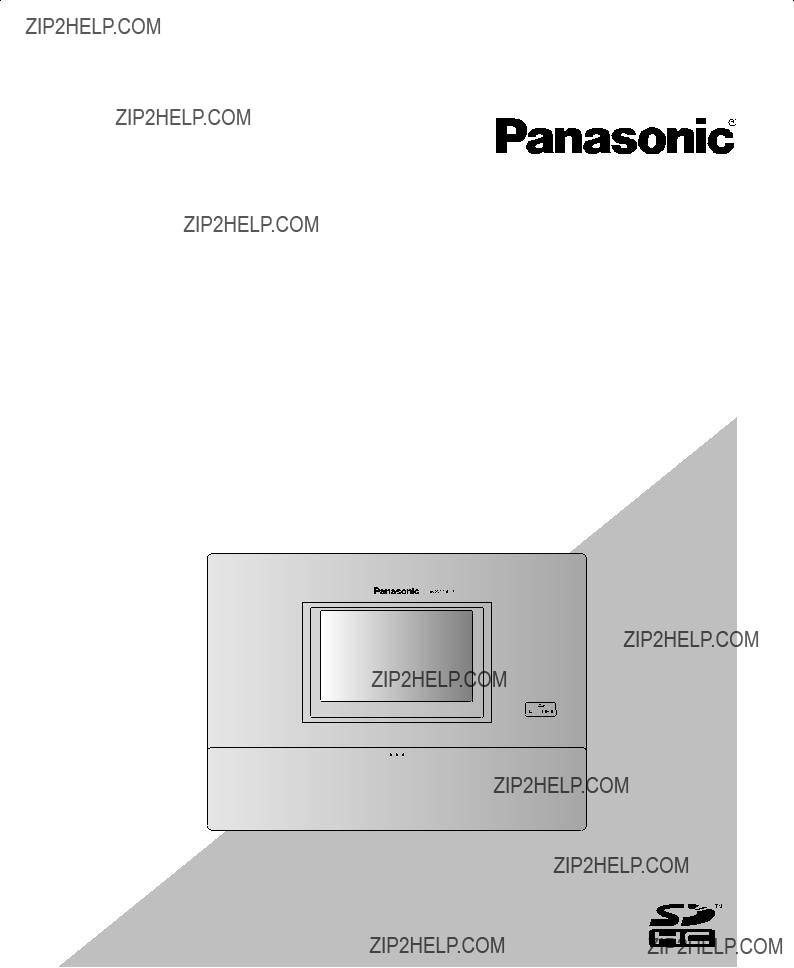
Operating Instructions <Browser Guide>
Center Module
Model No.

Operating Instructions <Browser Guide>
Center Module
Model No.

Contents
2

Before use
wwPreface
The WX???CC411 and WX???CC412 are Center Modules for the wireless intercom systems that are used in
wwFeatures
pp The WX???CC411 is designed for single lane operation of
ppA system compliant with the 1.9???GHz band DECT* standard is used so the voices of the store personnel and customers are heard clearly and distinctly even in open areas, and interference is minimal, resulting in stable communication.
*Digital Enhanced Cordless Telecommunications
pp A high degree of vocal clarity is ensured by a powerful echo canceller and digital noise reduction (Digital Noise Reduction). pp The cabinet supports
ppThe total number of
pp This unit has a 7???Type LCD display with a touch panel, and is easy to operate.
pp This unit can be connected to an IP network using Ethernet to enable remote control operations to be performed. pp Using an SD card, it is possible to back up and restore the settings, and save messages unique to the outlet.
ppThe system contains a scheduler to enable the greeter message to be changed at designated times and reminder messages to be played back automatically.
ppUp to four Network Cameras made by Panasonic can be registered, and their images can be monitored on this unit???s LCD display.
ppAlert signals that have been received can be sent to the
wwSystem diagram
By connecting the Center Module and
Order post
Center Module
3

Before use
wwOperation
This system supports the following operations that are suited to
Single lane
Operations in an environment in which only one order post is installed are referred to as ???single lane??? operations. These lane operations are supported by the WX???CC411.
 Hello
Hello 
 ORDER POST
ORDER POST
WINDOW
Dual lane
Operations in an environment in which the order posts are installed in parallel are referred to as ???dual lane??? operations.
With dual lane operations, the vehicle detectors for lane A and lane B operate independently of each other, and when each of these vehicle detectors is set to ON, the greeter message for the lane concerned is played back.
These lane operations are supported by the WX???CC412.
 Hello
Hello 
 LANE B
LANE B
 ORDER POST
ORDER POST
 Hello
Hello 
 LANE A
LANE A
 ORDER POST
ORDER POST
WINDOW
LANE A
WINDOW
LANE B
4
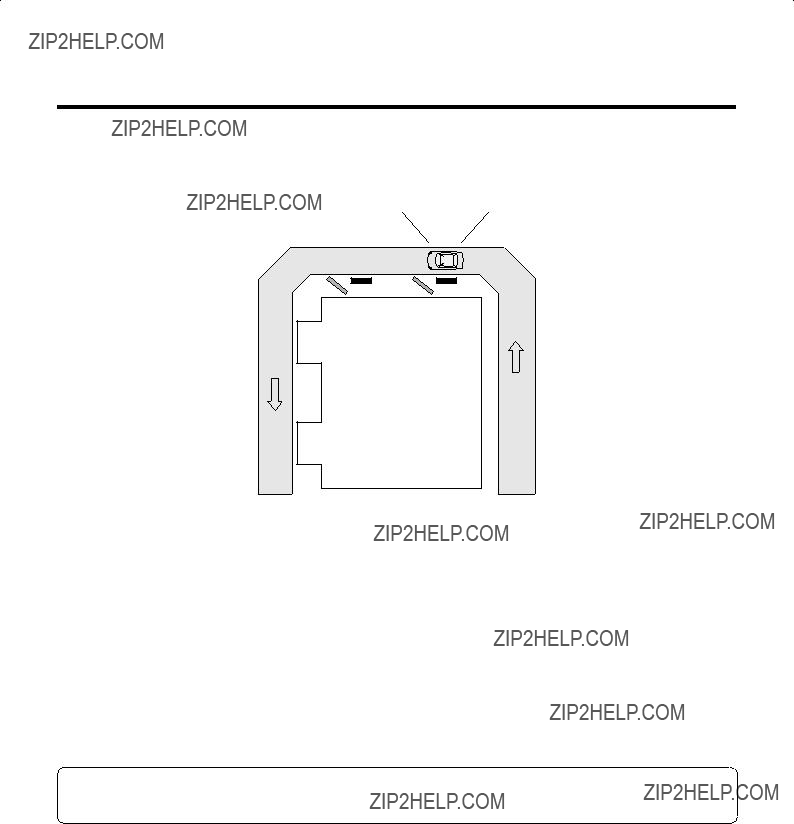
Before use
Tandem lane
Operations in an environment in which the order posts are installed in series are referred to as ???tandem lane??? operations. When the vehicle detector for lane A is OFF and the vehicle detector for lane B is set to ON, a tandem lane message urging the customer to move to lane A is played back.
These lane operations are supported by the WX???CC412.
WINDOW
LANE A
WINDOW
LANE B
wwConcerning the Operating Instructions
The Operating Instructions consist of the Operating Instructions <Installation Guide>, Operating Instructions <Setup Instructions> (PDF file) and Operating Instructions <Browser Guide> (PDF file).
ppOperating Instructions <Installation Guide>:
These instructions describe how to connect the Center Module with the required devices, how to install them and how to
perform settings (excerpted).
pp Operating Instructions <Setup Instructions> (PDF file):
These instructions describe the settings that must be performed before this unit can be used.
ppOperating Instructions <Browser Guide> (this manual: PDF file): These instructions explain access from the browser.
To read PDF files, you will need Adobe?? Reader?? which is available from Adobe Systems. When Adobe?? Reader?? is not installed on the PC, download the latest Adobe?? Reader?? from the Adobe web site and install it.
Important
ppDownload the ???Operating Instructions <Setup Instructions>??? from the home page given below.
5

Before use
wwSystem requirements
wwTrademarks and registered trademarks
ppAdobe, Acrobat Reader, and Adobe Reader are either registered trademarks or trademarks of Adobe Systems Incorporated in the United States and/or other countries.
pp Microsoft, Windows, and Internet Explorer are either registered trademarks or trademarks of Microsoft Corporation in the United States and/or other countries.
pp Screen shots are used in accordance with Microsoft Corporation guidelines. pp SD, SDHC Logo is a trademark of SD???3C, LLC.
ppOther names of companies and products contained in these operating instructions may be trademarks or registered trademarks of their respective owners.
wwAbbreviations
The following abbreviations are used in this document.
pp Microsoft?? Windows?????7 Professional SP1
pp SDHC and SD memory cards are referred to as ???SD cards???. pp Universal Plug and Play is referred to as UPnP??? or UPnP.
6

Operating precautions
wwRouter
When connecting the Center Module to the Internet via a router, use a broadband router with port forwarding function (e.g. NAT, IP masquerade).
wwBrowser Refresh Rate
The browser refresh rate may become slower depending on the network environment, computer performance and traffic.
wwBrowser Compatibility
This unit is compatible with Internet Explorer 9/10. If another browser or another version of Internet Explorer is used, the program may not be displayed or run properly.
7

Network
wwExamples of connections
qqDirect connection to the PC
PC
Ethernet cable (category???5, crossover)
qqConnection to a network via a hub
Panasonic Network Camera
wwNetwork Security
Security functions of the Center Module
Hub
PC
Ethernet cable (category 5, straight)
1Limiting access with user authentication
Limits users who can access the Center Module.
2Limiting access by changing the HTTP port
Changing the HTTP port number prevents port scanning and other types of unauthorized access.
3Encrypting access with HTTPS
Using HTTPS enables encryption of access to the Center Module to increase the security of communications.
Important
ppAuthentication information (e.g. usernames, passwords), server information and other types of information can be leaked on the network. Take measures to prevent this from happening, such as limiting access by user authentication or encryption of access with HTTPS.
pp Always close all browsers after accessing the Center Module to increase security. pp Change user IDs and passwords often to strengthen security.
Note
ppIf user authentication fails (authentication error) 8 or more times in 30???seconds from a PC with an identical IP address, access to the Center Module will be blocked temporarily.
ppIf 10???minutes or more passes without any operation, clicking on buttons will not perform the action intended, and instead will return to the
8

Browser Operation
wwConnecting the Center Module via a PC
1 Launch the PC???s Web browser.
2Input the Center Module IP address into the address bar of the Web browser.
Example) http://Center Module IP address
This unit has the following default settings as the time of shipment:
IP address: 192.168.0.50
Port number: 80
Protocol: http
Important
ppIf the HTTP port number has changed from ???80???, input [http://Center Module IP address: port number] into the [Address bar].
Example) If the port number is set to 8080: http://192.168.0.50:8080
3When a connection has been established between the Center Module and the PC, an authentication
The following are the default setting username and password:
Username: admin
Password: 12345
ppIf authentication is successful, the operation screen will appear.
Note
ppThe IP address of the Center Module can be checked on the Center Module screen. For details, refer to the Operating Instructions <Installation Guide>.
Important
ppBe sure to change the username and password to ensure that the system is secure. For details, see ???Configuring server settings??? (p.???13).
wwSetup Instructions
This section describes basic operation procedures to set this unit with browser operations.
1
2
1Input the necessary information into the settings.
2 Click the [Set] button.
Important
ppThe settings will not be reflected unless the [Set] button is clicked.
ppDo not click the button repeatedly. Doing so may result in the settings being set incorrectly.
9
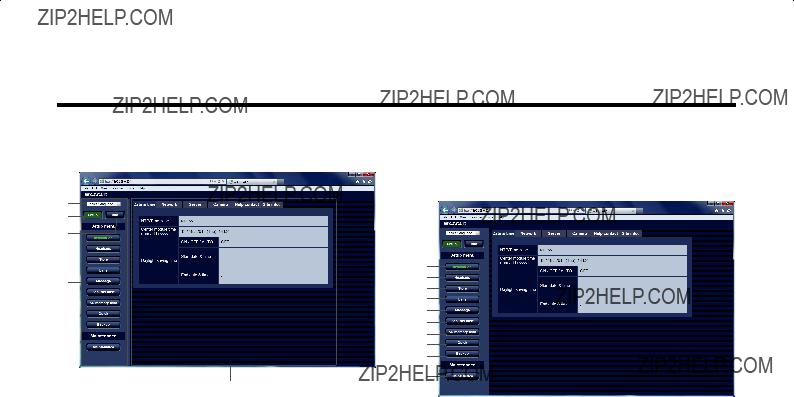
Browser Operation
wwOperation Screen
2
3
4
1
5
???Menu panel
Displays the panel for each menu.
The menu panel displays the Setup menu and the Information menu.
???[select language]
Changes the display language.
Languages that are available are English and French. The screen following authentication will be displayed in English.
???Setting button [Setup]
When selected, this button turns green and the menu panel displays the Setup menu panel. (on the right)
???Information display button [Info]
When selected, this button turns green and the menu panel displays the Information menu panel. (p.???33)
???Main area
Displays the screen corresponding to the button selected.
wwSetup Menu
When the [Setup] button is clicked, the menu panel displays the Setup menu panel.
1
2
3
4
5
6
7
8
9
:
Setup menu
???[Installation] button
This menu is used to configure and confirm settings related to the Center Module installation. (p.???11)
???[Headsets] button
This button is used to confirm the
???[Store] button
This button is used to confirm store
???[Lane] button
This button is used to confirm settings for each lane. (p.???19)
???[Message] button
This button is used to confirm settings for greeter messages, reminder messages and alert messages. The schedule settings can be confirmed for greeter messages and reminder messages. Sound source files to be used for the messages can be changed or downloaded. (p.???20)
???[Security alert] button
This button is used to confirm the settings of the operations to be performed when a security alert occurs. (p.???25)
10

Browser Operation
7[SD memory card] button
This button is used to confirm the total storage capacity and remaining storage capacity on the SD card inserted into the Center Module. (p.???26)
8[Quick] button
This button is used to confirm the operation settings that
9[Backup] button
This button is used to back up Center Module settings and the message voice source file. (p.???27)
Maintenance
:[Maintenance] button
This button is used to perform various maintenance tasks.
Important
ppThe maintenance menu is for maintenance staff. Altering settings and performing operations using the maintenance menu may affect store operation.
wwConfiguring and Confirming
Settings at Installation
This section describes how to configure and confirm settings related to installation, such as date and time settings, network settings, each server setting, Network Camera settings, help contact and site information.
To display this screen, click the [Installation] button in the Setup menu panel.
qqConfirming the date and time setting [Date & time]
This function is used to confirm the date, time and daylight saving time settings for the Center Module.
To display this screen, click the [Installation] button, then the [Date & time] tab.
After authentication, the following screen will be displayed.
[NTP/ Time zone]
Clicking on [NTP>>] displays the [Server] tab.
The NTP server settings can be configured in the [Server] tab.
[Center module time]
Displays the current date and time of the Center Module. The date is displayed in the format of MONTH / DAY / YEAR. The time is displayed as a 24???hour clock.
[Daylight saving time ON/OFF/AUTO]
Displays the setting for daylight saving time.
AUTO: Daylight saving time is set based on the set date and time to start and end (Month, week, day of the week, time).
[Daylight saving time Start date & time], [Daylight saving time End date & time]
Displays the start date and time and end date and time when Daylight Saving time is set to AUTO.
11

Browser Operation
qqConfiguring network settings [Network]
This function is used to configure the network settings of the Center Module.
Click the [Installation] button, then the [Network] tab.
IPv4 Network
[DHCP / Static]
Displays the DHCP of the Center Module. This setting can be changed through operations on the Center Module. DHCP: Operating with the DHCP setting ON.
Static: Operating with the DHCP setting OFF (static IP address).
[MAC address]
Displays the MAC address of the Center Module.
[IP address]
Displays the IP address of the Center Module. This setting can be changed through operations on the Center Module.
[Subnet mask]
Displays the subnet mask of the Center Module. This setting can be changed through operations on the Center Module.
[Default gateway]
Displays the default gateway of the Center Module. This setting can be changed through operations on the Center Module.
[DNS Auto / Manual]
Set whether to retrieve the DNS server address automatically (???Auto???) or input it manually (???Manual???). When set to ???Manual???, the DNS setting must be configured. When using the DHCP function, if ???DNS??? is set to ???Auto???, the DNS server address will be retrieved automatically. Inquire with the system administrator for questions about settings. Default setting: Manual
[Primary DNS server address], [Secondary DNS server address]
If ???DNS??? is set to ???Manual???, the IP address of the DNS server must be entered manually.
Inquire with the system administrator for questions about the DNS server IP address.
Default setting: None (blank)
[Line speed]
Displays the network transmission rate setting of the Center Module. This setting can be changed through operations on the Center Module.
Web server
[Connection]
Select the method for connecting to the Center Module. HTTP: Can only connect by HTTP.
HTTPS: Can only connect by HTTPS.
Default setting: HTTP
[HTTP port]
Set the port number to be used in HTTP.
Settable port numbers: 1 to 65535
Default setting: 80
[HTTPS port]
Set the port number to be used in HTTPS.
Settable port numbers: 1 to 65535
Default setting: 443
Important
ppIf Web server settings are altered, the Center Module will restart automatically.
pp If HTTPS is selected, the Center Module will automatically generate an SSL server certificate. This is only compatible with SSL
ppThe following port numbers cannot be used. (Excluding the port number set in the default settings.) 20, 21, 23, 25, 42, 53, 67, 68, 69, 80, 110, 123, 161, 162, 443, 995, 10669, 10670
12
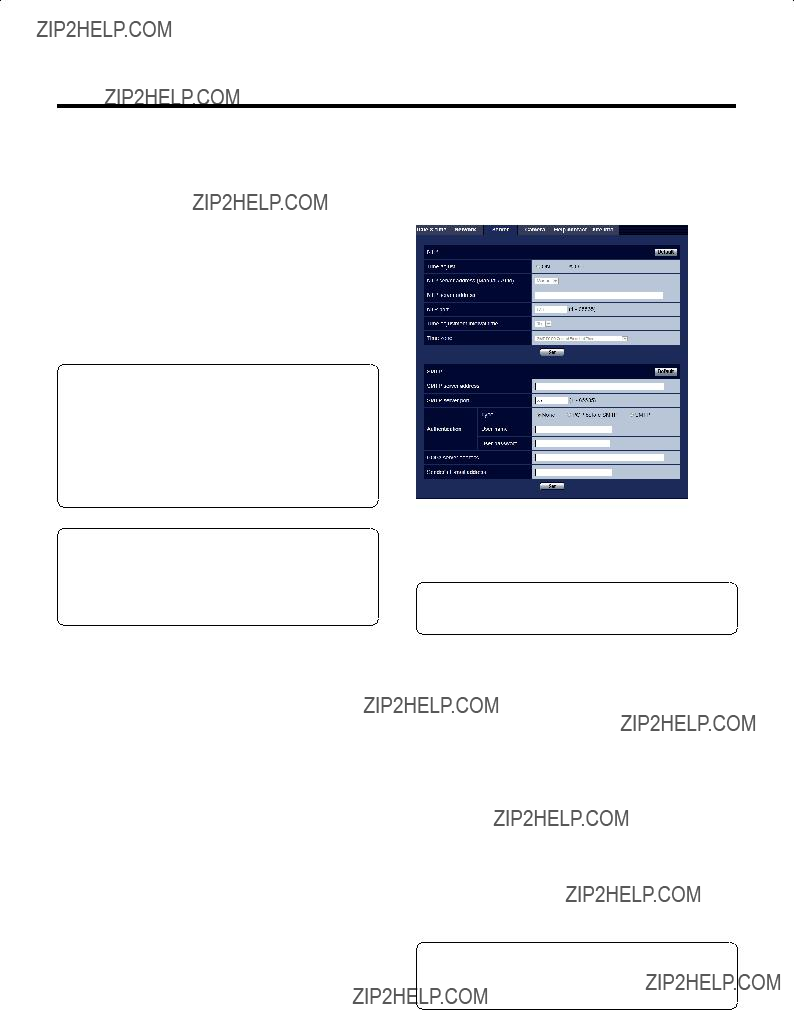
Browser Operation
UPnP
The Center Module is compatible with UPnP (Universal Plug and Play). Using UPnP function, you can configure the following settings automatically.
Set the router port forwarding function. (A router that is compatible with UPnP is required.) This setting is useful for accessing the Center Module via the Internet.
[Auto port forwarding]
Set whether or not to use the router???s port forwarding function with the ON and OFF radio buttons. To use the auto port forwarding function, the router being used must be the UPnP compatible and UPnP function must be enabled. Default setting: OFF
Note
ppAuto port forwarding may change the port number. If the port number has been changed, the Center
Module port number registered to the PC must also be changed.
ppTo check if auto port forwarding has been set correctly, click the [Status] tab of the [Maintenance] button in the Setup menu panel and confirm that the [UPnP] status is [Enabled].
Important
ppIf UPnP settings are altered, the Center Module will restart automatically.
ppWhen changing port forwarding settings, check the status of the router using the Operating Instructions for the router.
qqConfiguring server settings [Server]
This function is used to configure the settings of the server connected to the Center Module.
Click the [Installation] button, then the [Server] tab.
NTP
Configure the NTP server settings, such as the NTP server address and port number.
Important
ppIf a more accurate time setting is needed for system operation, use the NTP server.
[Default] button
This button is used to restore the NTP settings to the default settings.
[Time adjust]
Set whether or not to retrieve the time from the NTP server.
Default setting: OFF
[NTP server address (Manual / Auto)]
When [ON] is selected for [Time adjust], a method for retrieving the NTP address must be selected.
Manual: Input the NTP server address into the [NTP server address] to set.
Auto: Retrieve the NTP server address from the DHCP server.
Default setting: Manual
Important
ppWhen retrieving the ???NTP server address??? from the DHCP server, the DHCP function must be enabled through operations on the Center Module.
13

Browser Operation
[NTP server address]
If ???Manual??? is selected for [NTP server address (Manual / Auto)], enter the NTP server IP address or host name manually.
Number of characters: 1 to 128
Types of characters: alphanumeric, characters
Default setting: None (blank)
Important
ppWhen entering the host name into the ???NTP server address???, the DNS setting must be configured on the [Network] tab of the [Installation] button on the Setup menu panel.
[NTP port]
Input the NTP server port number.
Settable port numbers: 1 to 65535
Default setting: 123
Important
ppThe following port numbers cannot be used. (Excluding the port number set in the default settings.) 20, 21, 23, 25, 42, 53, 67, 68, 69, 80, 110, 123, 161, 162, 443, 995, 10669, 10670
[Time adjustment interval time]
Select the interval for retrieving the time from the NTP server (1???hour units, from 1 to 24???hours).
Default setting: 1h
[Time zone]
Select the time zone corresponding to the region in which this unit is being used.
Default setting:
SMTP
Configure the settings of the email server for sending emails from the Center Module.
[Default] button
This button is used to restore the SMTP settings to the default settings.
[SMTP server address]
Input the IP address or host name of the SMTP server for sending email.
Number of characters: 1 to 128
Types of characters: alphanumeric, characters
Default setting: None (blank)
[SMTP server port]
Input the port number for sending email.
Settable port numbers: 1 to 65535
Default setting: 25
Important
ppThe following port numbers cannot be used. (Excluding the port number set in the default settings.) 20, 21, 23, 25, 42, 53, 67, 68, 69, 80, 110, 123, 161, 162, 443, 995, 10669, 10670
[Authentication]
ppType
Select one of the following authentication methods for
Default setting: None
Note
ppIf unsure of which authentication type to use for sending email, inquire with the system administrator.
ppUser name
Input the username for accessing the server. Number of characters: 0 to 32
Default setting: None (blank)
pp User password
Input the password for accessing the server.
Default setting: None (blank)
[POP3 server address]
If [POP before SMTP] is selected for [Authentication Type], input the POP3 server IP address or host name manually. Number of characters: 1 to 128
Types of characters: alphanumeric, characters
Default setting: None (blank)
14

Browser Operation
[Sender???s
Input the sender???s email address. The email address entered will appear in the ???From??? line on the email being sent. Number of characters: 3 to 128
Types of characters: alphanumeric, characters @ . _ ???
Default setting: None (blank)
qqSetting Network Cameras connected to the unit [Camera]
This tab is used to set Network Cameras displayed on the LCD display of the Center Module. Setting Network Cameras enables camera images from vehicle detectors to be displayed on the Center Module in tandem with security alerts.
Click the [Installation] button, then the [Camera] tab.
Camera 1 to 4
A maximum of four Network Cameras can be connected to the Center Module. This section describes how to set Network Cameras connected to the unit.
Important
ppNetwork Cameras that can be connected to the Center Module are Panasonic
ppBe sure to set HTTP for the Network Camera connection method setting.
ppConfigure the Network Cameras to the following settings:
??Aspect ratio: 4:3
??Image quality: standard
[Delete] button
This button is used to restore the Network Camera settings to the default settings.
[IP address]
Input the IP address of the Network Cameras that are connected to the unit.
Default setting: None (blank)
[HTTP port]
Input the port number of the Network Cameras that are connected to the unit.
Settable port numbers: 1 to 65535
Default setting: 80
[Authentication]
Configure this setting if the user authentication setting is set to ???ON???.
ON:
OFF:
[User name]
If [ON] is selected for [Authentication], input the username for accessing the Network Cameras.
Number of characters: 0 to 32
Default setting: None (blank)
[User password]
If [ON] is selected for [Authentication], input the password for accessing the Network Cameras.
Number of characters: 0 to 32
Default setting: None (blank)
15
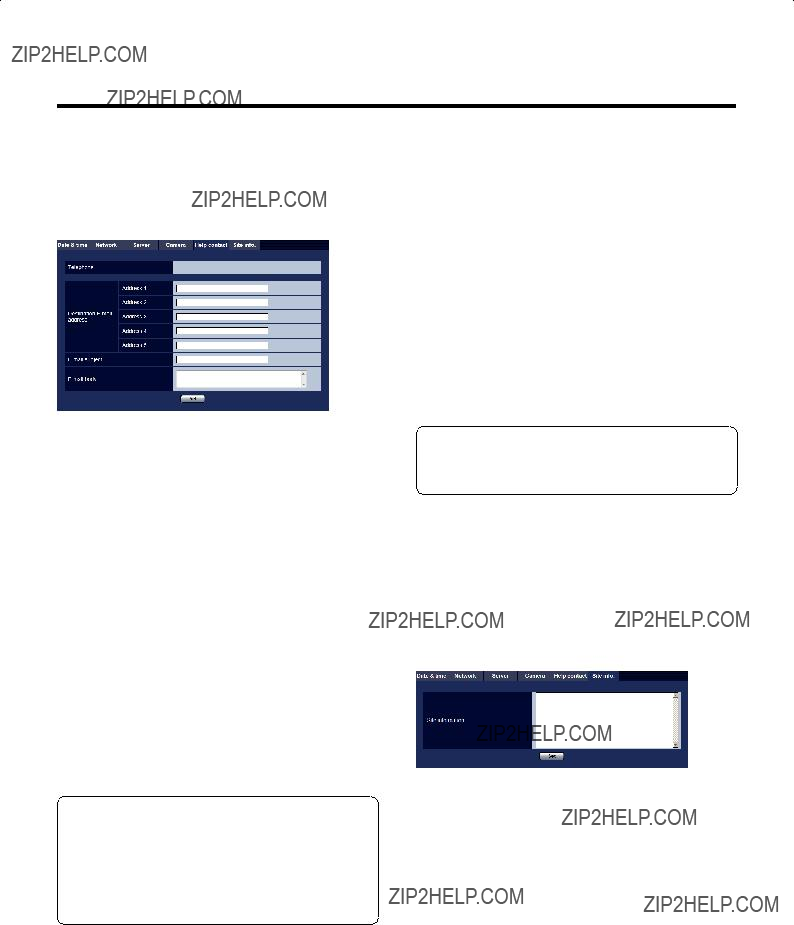
Browser Operation
qqSetting Help contact [Help contact]
This tab is used to check the telephone number and configure the email transmission settings for the Help contact screen displayed on the LCD display of the Center Module.
Click the [Installation] button, then the [Help contact] tab.
[Telephone]
This field displays the telephone number. This setting can be changed through operations on the Center Module unit.
Configuring Help contact email transmission settings
This area is used to configure the email to be sent from the LCD display Help contact screen.
[Destination
Set the destination email addresses. The same message can be sent to up to 5???email addresses.
Number of characters: 3 to 128
Types of characters: alphanumeric, characters @ . _ ???
Input the subject of the email.
Number of characters: 0 to 50
Input the body of the email.
Number of characters: 0 to 200
Note
ppThe SMTP server must be set before an email can be sent. To set the SMTP server, click the [Installation] button, then the [Server] tab.
ppThe following substitute characters can be used in the email body. The substitute characters will be replaced with the corresponding character string when the email is sent.
Important
ppWhen using the Help contact email function, confirm that emails can be sent correctly in advance when the unit is installed.
qqSetting Site information [Site info.]
This tab is used to input information particular to the store in which the unit is installed, such as the contact number for the store and management information. This information is used when viewing store information from a browser. This information can only be set and viewed with a browser.
Click the [Installation] button, then the [Site info.] tab. Number of characters: 0 to 200
16

Browser Operation
wwConfirming the group settings for
This function is used to confirm the group settings for
To display this screen, click the [Headsets] button in the Setup menu panel.
wwConfirming store settings
This screen is used to confirm the nighttime volume, store hours and tandem lanes
To display this screen, click the [Store] button in the Setup menu panel.
qqConfirming nighttime volume settings [Nighttime volume]
This tab is used to confirm nighttime volume settings. This setting can be changed through operations on the Center Module.
Click the [Store] button, then the [Nighttime volume] tab.
Click the tab of the group you wish to view (Group???1 to Group???6).
[Nighttime volume]
Displays whether or not nighttime volume is being used.
[Level
Displays the nighttime volume level.
[Start time / Ending time]
Displays the time to start and end the nighttime volume function. If ???Auto??? is set for nighttime volume, the volume will be controlled according to these time settings.
17
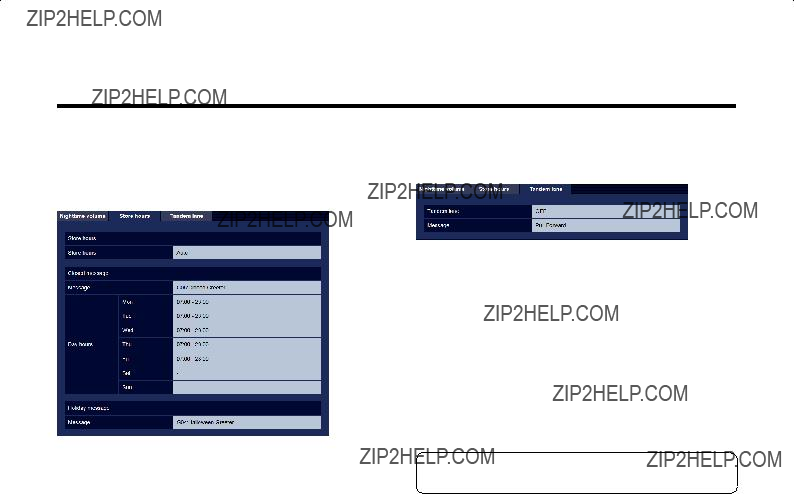
Browser Operation
qqConfirming store hours [Store hours]
This tab is used to confirm store hours settings. This setting can be changed through operations on the Center Module. Click the [Store] button, then the [Store hours] tab.
Store hours
[Store hours]
Displays whether or not store hours is being used.
Closed message
[Message]
Displays the greeter message that is played when the store is closed (the store hours settings are Closed or AUTO).
[Day hours]
Displays the store hours for each day of the week.
Holiday message
[Message]
Displays the greeter message that is played when the [Store hours] setting is set to Holiday.
qqConfirming tandem lanes [Tandem lane] (WX???CC412 only)
[Tandem lane]
This tab displays the settings for tandem lanes. This setting can be changed through operations on the Center Module. ON: Tandem lane
OFF: Dual lane
[Message]
Displays the greeter message that is played from the Lane B order post speaker when the Lane A vehicle detector is OFF and the Lane B vehicle detector is ON.
Note
pp See ???Operation??? (p.???4) for details on tandem lanes.
18

Browser Operation
wwConfiguring and confirming settings for each lane
This tab is used to configure and confirm settings for each lane.
To display this screen, click the [Lane] button in the Setup menu panel.
To configure and confirm settings for Lane B, click the [Lane???B] tab. (WX???CC412 only)
[Input volume
Displays the input volume for each
Outside mic: Displays the volume of the order post microphone.
Displays the volume of the kitchen microphone. Displays the volume of the line input. Displays the volume of the beep tone.
[Output volume
Displays each output volume. The volume range is from 0 to 20. This setting can be changed through operations on the Center Module.
Outside speaker: Displays the volume of the order post
[Aux speaker
Displays the input sound source file and the volume of the file to be output to the kitchen speaker. This setting can be changed through operations on the Center Module.
[Device for Line in]
Displays the output destination for line input. Line input will be output to all
You can change the output device for [LINE IN].
For details, contact the store where you purchased this unit.
[Source for Line out]
Displays the input sound file source for line output. The output destination for the line sound source file will be the same as that of the sound source file output from the order post speaker.
You can change the audio source for [LINE OUT].
For details, contact the store where you purchased this unit.
19

Browser Operation
[DSP]
This section displays the settings for the three functions involved in voice signal processing (echo canceller, digital noise reduction and ASLC).
Echo Canceller: Displays the echo suppression level. (OFF/ LOW/MID/HIGH)
Digital noise reduction:
Displays the noise suppression level. (OFF/ LOW/MID/HIGH)
ASLC: Displays whether or not Auto Speaker Level Control is being used.
[V/Det camera]
Images from Network Cameras can be displayed on the Center Module LCD display in tandem with the vehicle detector. Select the Network Camera(s) to be displayed on the LCD display.
OFF: The Network Camera(s) are not coupled to the vehicle detector.
Camera 1/2/3/4: When the vehicle detector is ON, the Network Cameras are displayed on the LCD display in tandem with the vehicle detector.
Default setting: OFF
Note
ppBe sure to set a camera that is connected in advance when outputting the NW camera image. To set a camera that is connected, click the [Installation] button in the Setup menu panel, then the [Camera] tab.
wwConfirming message settings
This section is used to confirm the settings for each type of message and the schedule for messages.
To display this screen, click the [Message] button in the Setup menu panel.
qqConfirming greeter message settings [Greeter message]
This tab is used to confirm the settings of the greeter message played when the vehicle detector is ON. This setting can be changed through operations on the Center Module. Click the [Message] button, then the [Greeter message] tab.
[ON/OFF]
Displays whether or not greeter message is being used. OFF: The greeter message is not played back.
ON: The greeter message is played back.
[Volume (0 - 20)]
Displays the volume of the greeter message.
The volume range is from 0 to 20.
[Delay time (0 - 10s)]
Displays the time delay before playing the greeter message when the vehicle detector is ON. The range is 0 to 10 seconds.
[Destination]
Displays broadcast destinations other than the order post speaker from which the greeter message will be played.
ppAll headsets
OFF: The greeter message is not broadcast to any
ON: The greeter message is broadcast to all
ppAUX speaker
OFF: The greeter message is not broadcast to the kitchen speaker.
ON: The greeter message is broadcast to the kitchen speaker.
20
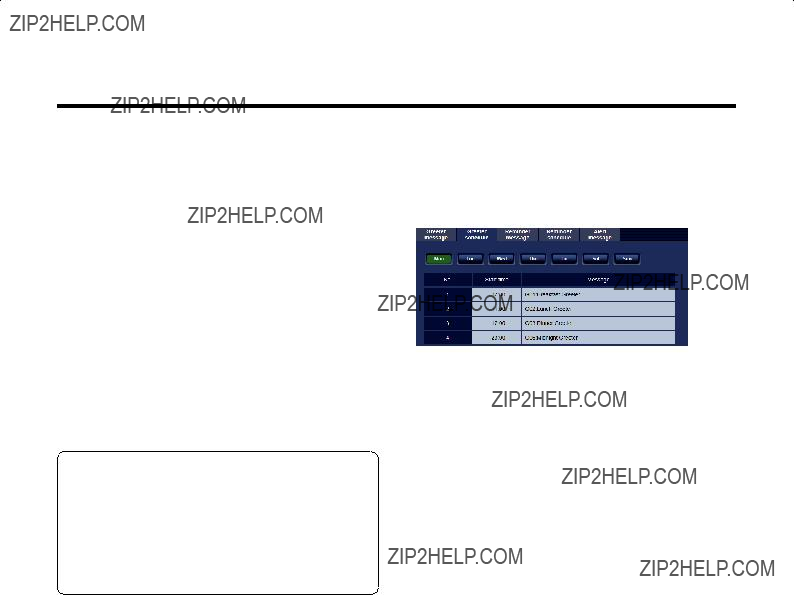
Browser Operation
Message list
Displays the settings for each greeter message. This setting can be changed through operations on the Center Module.
[No.]
Displays the number of the greeter message.
[Message name]
Displays the name of the greeter message.
[Upload] button
This button is used to upload a sound source file to replace the sound source file that is currently being used as the greeter message.
[Download] button
This button is used to download the sound source file being used as the greeter message from the Center Module. The button is disabled when there is no sound source file.
Important
ppSound source files are in the following format. Use compatible software when playing or editing files using a PC.
Format: ADPCM (G.726)
Sampling frequency: 8???kHz
Quantization bit rate: 4???bit
Sound source files that can be uploaded must be in the above format and no longer than 20???seconds.
qqConfirming greeter message schedule settings [Greeter schedule]
This tab is used to confirm greeter message schedule settings. Click the [Message] button, then the [Greeter schedule] tab.
[Days of the week]
The schedule for the selected day of the week is displayed. The schedule displays the start time for playing the greeter message and the message that will be played.
Schedule list
Displays the greeter message start times in a list. This setting can be changed through operations on the Center Module.
[No.]
Displays the number of the schedule.
[Start time]
Displays the start time of the greeter message.
[Message]
Displays the message number and name of the greeter message that will start.
21

Browser Operation
qqConfirming reminder message settings [Reminder message]
This tab is used to confirm the reminder message that is played at fixed times to urge the store personnel to work. Click the [Message] button, then the [Reminder message] tab.
[ON/OFF]
Displays whether or not reminder message is being used. This setting can be changed through operations on the Center Module.
[Volume (0 - 20)]
Displays the volume of the reminder message. The volume range is from 0 to 20. This setting can be changed through operations on the Center Module.
Message list
Displays the settings for each reminder message. This setting can be changed through operations on the Center Module.
[No.]
Displays the number of the reminder message.
[Message name]
Displays the name of the reminder message.
[Destination]
Displays the broadcast destinations for the reminder message.
ppGroup
Displays the broadcast destination group for the reminder message.
All Headsets: The reminder message is broadcast to all
Group number: The reminder message is broadcast to the
ppAUX
Displays whether or not the reminder message will be output to the kitchen speaker.
OFF: The reminder message is not output to the kitchen speaker.
ON: The reminder message is output to the kitchen speaker.
[Upload] button
This button is used to upload a sound source file to replace the sound source file that is currently being used as the reminder message.
[Download] button
This button is used to download the sound source file being used as the reminder message from the Center Module. The button is disabled when there is no sound source file.
Important
ppSound source files are in the following format. Use compatible software when playing or editing files using a PC.
Format: ADPCM (G.726)
Sampling frequency: 8???kHz
Quantization bit rate: 4???bit
Sound source files that can be uploaded must be in the above format and no longer than 20???seconds.
22

Browser Operation
qqConfirming reminder message schedule settings [Reminder schedule]
This tab is used to confirm reminder message schedule settings. Click the [Message] button, then the [Reminder schedule] tab.
[Days of the week]
The schedule for the selected day of the week is displayed. The schedule displays the time to play back the reminder message and the message that will be played.
Schedule list
Displays the reminder message playback schedules in a list. This setting can be changed through operations on the Center Module.
[No.]
Displays the number of the schedule.
[Start ??? Ending time]
Displays the start time for playing back the reminder message and the time to stop repeating playback.
Note
ppThe ending time is only displayed when the Interval is ON. It is displayed as ???-
[Interval]
Displays whether or not to repeat playback of the reminder message.
OFF: The reminder message is played back only 1???time, at the Start Time.
ON: The reminder message is played back repeatedly at fixed intervals, beginning from the Start Time.
[Interval time]
Displays the repeating interval for playing back the reminder message. You can set this from 00:00 to 23:59 in increments of 1???minute.
[Message]
Displays the message number and name of the reminder message that will be played.
23
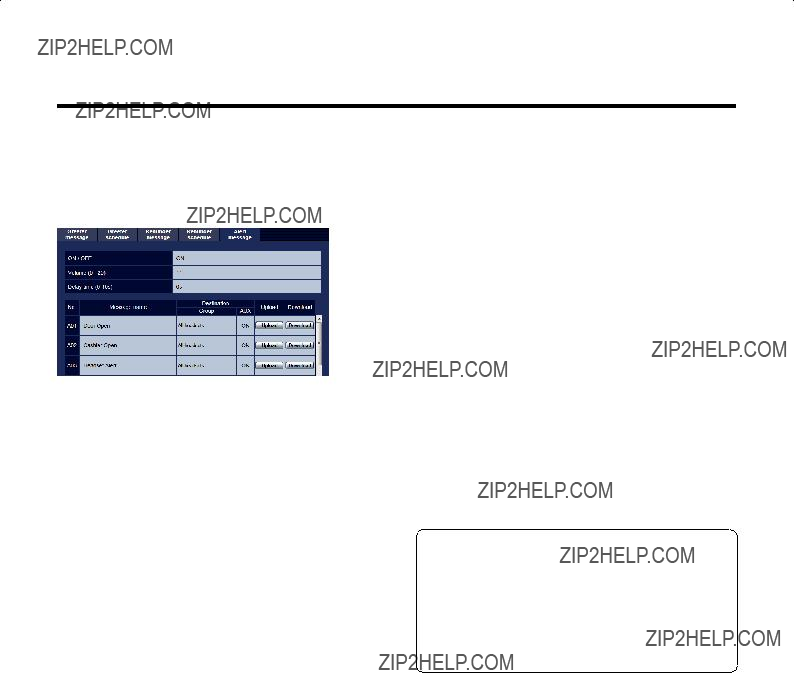
Browser Operation
qqConfirming alert message settings [Alert message]
This tab is used to confirm the alert message to be played during a security alert. Click the [Message] button, then the [Alert message] tab.
[ON/OFF]
Displays whether or not alert message is being used. This setting can be changed through operations on the Center Module.
OFF:
ON:
[Volume (0 - 20)]
Displays the volume of the alert message. The volume range is from 0 to 20. This setting can be changed through operations on the Center Module.
[Delay time (0 - 10s)]
Displays the delay time after the occurrence of an alert until the alert message is played back. The range is 0 to 10 seconds.
Message list
Displays the settings for each alert message. This setting can be changed through operations on the Center Module.
[No.]
Displays the number of the alert message.
[Message name]
Displays the name of the alert message.
[Destination]
ppGroup
Displays the broadcast destination group for the alert message.
All Headsets: The alert message is broadcast to all All-
ppAUX
Displays whether or not the alert message will be output to the kitchen speaker.
OFF: The alert message is not output to the kitchen speaker.
ON: The alert message is output to the kitchen speaker.
[Upload] button
This button is used to upload a sound source file to replace the sound source file that is currently being used as the alert message.
[Download] button
This button is used to download the sound source file being used as the alert message from the Center Module. The button is disabled when there is no sound source file.
Important
ppSound source files are in the following format. Use compatible software when playing or editing files using a PC.
Format: ADPCM (G.726)
Sampling frequency: 8???kHz
Quantization bit rate: 4???bit
Sound source files that can be uploaded must be in the above format and no longer than 20???seconds.
24

Browser Operation
wwConfirming the security alert settings
This screen is used to confirm the operations to be performed when a security alert notice is received from button F of an
To display this screen, click the [Security alert] button in the Setup menu panel.
List of alerts
Displays the types of security alerts and the operations to perform in the event of a security alert.
[Trigger] column
Displays the types of security alerts.
[Message] column
Displays the alert message to be played during each type of security alert. This setting can be changed through operations on the Center Module.
OFF:The alert message is not played back.
Message number: The alert message is played back.
[Camera monitor] column
Displays the number of the Network Camera that is displayed on the LCD display during each type of security alert. This setting can be changed through operations on the Center Module.
OFF:The image of the Network Camera is not displayed on the LCD display.
Camera number: The image of the Network Camera is displayed on the LCD display.
[Device control] column
Displays whether or not to control external control outputs during each type of security alert. This setting can be changed through operations on the Center Module.
OFF: External control outputs are not controlled.
ON: External control outputs are controlled.
[Audio recording] column
Displays whether or not to record communications onto the SD card when a security alert notice is received from button F of an
OFF: Communications are not recorded.
ON: Communications are recorded.
[Alert input delay time] column
Displays the delay time until sounding a security alert from alert inputs 1 to 4. Can be set from 0 to 29 minutes 59???seconds in increments of 1???second.
Set whether or not to send an
ON: An
OFF: An
Default setting: OFF
Mail for F button
Set the details of the
is set to be sent upon receiving button F of an
[Destination
Set the destination email addresses. The same message can be sent to up to 5 email addresses.
Number of characters: 3 to 128
Types of characters: alphanumeric, characters @ . _ ???
Input the subject of the email.
Number of characters: 0 to 50
Input the body of the email.
Number of characters: 0 to 200
25

Browser Operation
Note
ppThe SMTP server must be set before an email can be sent. To set the SMTP server, click the [Installation] button, then the [Server] tab.
ppThe following substitute characters can be used in the email body. The substitute characters will be replaced with the corresponding character string when the email is sent.
Mail for Alert * (*: 1 to 4)
Set the details of the
wwConfirming the remaining capacity and the total capacity of the SD card
This tab is used to confirm the total capacity and remaining capacity on an SD card inserted into the Center Module. To display this screen, click the [SD memory card] button in the Setup menu panel.
[Remaining capacity]
Displays the remaining capacity of the SD card. Displayed as ???Remaining capacity / Total capacity???.
If there is no SD card inserted, this field displays
26

Browser Operation
wwConfirming quick operation settings
This button is used to confirm the operation settings that were set by touching the (Quick Operation button) on the Center Module. This setting can be changed through operations on the Center Module.
To display this screen, click the [Quick] button in the Setup menu panel.
[Speed team]
Displays the Speed team settings. OFF: No Speed team operation.
ON: The vehicle detectors are shut off and Speed team operation is in effect.
[Cross beep]
Displays the Cross beep settings.
OFF: A beep tone is only heard when the vehicle detector of the corresponding lane for the
ON: A beep tone is also heard when the vehicle detector of the other lanes in addition to the corresponding lane for the
Lane A setting
Lane B setting (WX???CC412 only)
[V/Det override]
Displays the V/Det override settings.
OFF: Vehicle detectors turn ON when a vehicle approaches.
ON: The vehicle detectors are virtually ON.
wwBacking up settings
This tab is used to back up Center Module settings and messages.
To display this screen, click the [Backup] button in the Setup menu panel.
[Execute] button
This button is used to back up Center Module settings and message voice source files to the PC.
Note
ppData that has been backed up is extracted to the following folder on the SD card. When restored on the Center Module, the settings can be restored to those used at the time of backing up.
SD card route:
\PRIVATE\PANA_GRP\PSN\DWCS\BACKUP
ppMessage voice source files cannot be backed up if an SD card is not inserted.
27
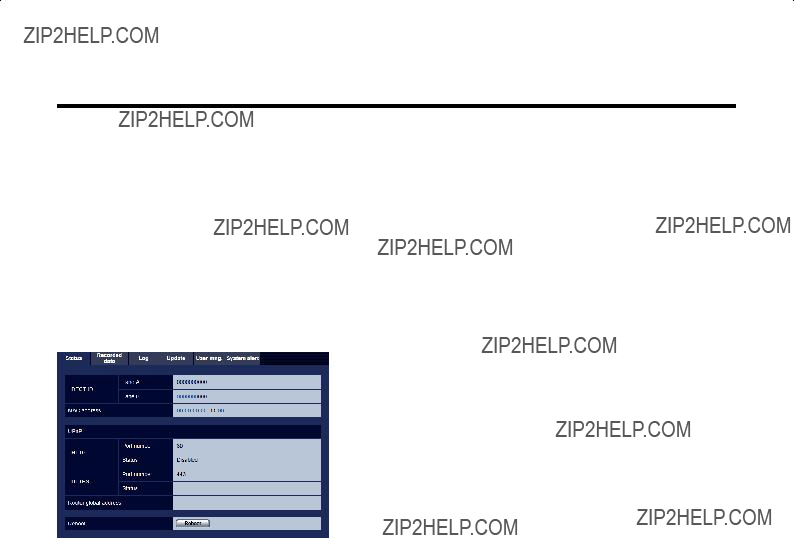
Browser Operation
wwPerforming maintenance on the
Center Module
This screen is used to check the status of and perform maintenance on each device. The maintenance menu is for maintenance staff.
To display this screen, click the [Maintenance] button in the Setup menu panel.
qqChecking the Center Module [Status]
This tab displays the status of the Center Module DECT ID, MAC address and UPnP.
Click the [Maintenance] button, then the [Status] tab.
[DECT ID]
Displays the DECT ID of the Center Module.
[MAC address]
Displays the MAC address of the Center Module.
UPnP
[HTTP]
Displays the information for an HTTP connection.
pp[Port number]
Displays the port number set for port forwarding in UPnP.
pp[Status]
Displays the port forwarding status. Displays
[HTTPS]
Displays the information for an HTTPS connection.
pp[Port number]
Displays the port number set for port forwarding in UPnP.
pp[Status]
Displays the port forwarding status. Displays
[Router global address]
Displays the global address of the router.
28

Browser Operation
Important
pp Check the [HTTP Status] / [HTTPS Status] after 10???minutes have passed since starting up the router and Center Module. pp The following chart shows the meaning and action to take for each port forwarding [HTTP Status] / [HTTPS Status].
[Reboot]
Clicking the [Reboot] button restarts the Center Module.
Important
ppWhen the Center Module is rebooted from a browser, the Center Module will restart without displaying a warning on the LCD display. Be sure to check the operational status before rebooting from a browser.
29
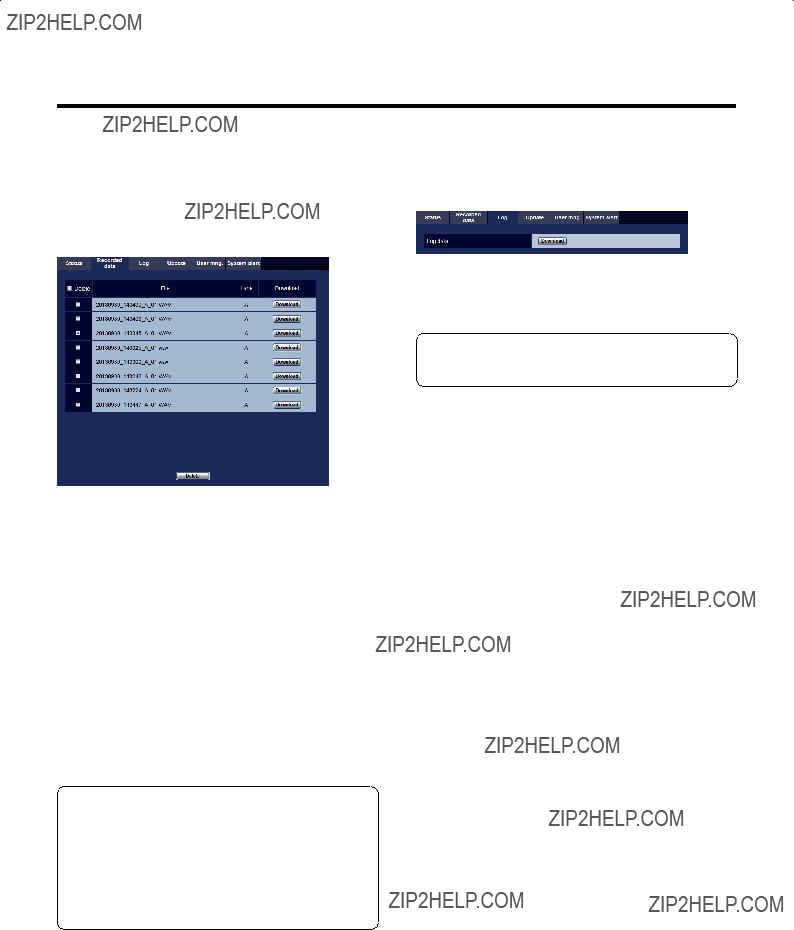
Browser Operation
qqRetrieving TALK & PAGE Recording sound source files [Recorded data]
This tab displays sound source files from TALK & PAGE Recording that were recorded during a security alert by holding down button F of an
[Delete] checkbox
Selects the checkboxes of all TALK & PAGE Recording sound source files. Delete the sound source files that are selected by clicking the [Delete] button.
[File] column
Displays the filename of the sound source file.
[Lane] column
Displays the lane for TALK & PAGE Recording.
[Download] button
This button is used to download a TALK & PAGE Recording file from the Center Module.
[Delete] button
This button is used to delete sound source files with checkboxes selected.
Important
ppSound source files are in the following format. Use compatible software when playing or editing files using a PC.
Format: ADPCM (G.726)
Sampling frequency: 8???kHz
Quantization bit rate: 4???bit
Sound source files that can be uploaded must be in the above format and no longer than 20???seconds.
qqRetrieving log data [Log]
This tab is used to download the operational log of the Center Module. Click the [Maintenance] button, then the [Log] tab.
[Download] button
This button is used to download the log file.
Important
ppNote that Panasonic cannot respond to inquiries about log data.
30

Browser Operation
qqConfirming the software version [Update]
This tab is used to confirm the software version. Software version updates can also be performed from this screen. Click the [Maintenance] button, then the [Update] tab.
[System version]
Displays the system version.
[CPU version]
Displays the CPU version.
[BBIC version]
Displays the BBIC version.
[DSP version]
Displays the DSP version.
[Execute] button
This button is used to update the version of the Center Module software.
qqSetting authentication [User mng.]
This tab is used to set authentication for accessing the Center Module from a browser.
Click the [Maintenance] button, then the [User mng.] tab.
[Authentication]
This
Digest or Basic : Use digest authentication or basic
Default setting: Digest or Basic
Note
ppAfter changing [Authentication] settings, close the web browser and
User ID change
[New user ID]
Displays the current user ID. To change the user ID, input a new username.
Number of characters: 4 to 32
Types of characters: alphanumeric, characters
31

Browser Operation
Password change
[Old password]
Input the current password. Number of characters: 4 to 32
Types of characters: alphanumeric, characters
[New password]
Input the new password. Number of characters: 4 to 32
Types of characters: alphanumeric, characters
[Confirm new password]
Input the new password for confirmation. Number of characters: 4 to 32
Types of characters: alphanumeric, characters
Important
pp Is not possible to create multiple user IDs. Changing the user ID causes the previous ID to be deleted.
ppTo change only the password, enter the current user ID into the field for [New user ID].
ppChange user IDs and passwords often to ensure security.
qqSetting the destination email addresses for sending emails during a system alert [System alert]
Click the [Maintenance] button, then the [System alert] tab.
[Destination Email address]
Set the destination email addresses. The same message can be sent to up to 5 email addresses.
Number of characters: 3 to 128
Important
pp
32

Information display menu
When the [Info] button is clicked, the menu panel displays the Information display menu panel.
1
2
[Manager]
This column displays the
???B??? is displayed for the manager of Lane B.
[Version]
This column displays the version of the
[Group]
This column displays the group to which the
1[Headsets] button
This button is used to check the status of
2[Alert] button
This button is used to check the status of security alerts and error alerts from the Center Module.
wwChecking the status of
One Headsets and Belt Packs
This tab is used to check the status of
To display this screen, click the [Headsets] button in the Information display menu panel.
[Last used date & time]
This column displays the date and time that the
[Headset no.]
This column displays the number of the
Note
ppThe number of the
wwChecking the status of alerts
This screen is used to check the status of security alerts and error alerts from the Center Module.
To display this screen, click the [Alert] button in the Information display menu panel.
qqChecking the status of security alerts [Security alert]
This tab displays security alerts that are currently occurring.
[Initiation time]
This column displays the time and date of security alerts.
[Cause]
This column displays the cause of security alerts that are occurring.
33

Information display menu
qqChecking the status of system alerts [System alert]
This tab displays information about errors that are occurring in devices that comprise the Center Module.
[Initiation time]
This column displays the time and date of system alerts.
[Cause]
This column displays the cause of system alerts that are occurring.
Important
ppOperation of the Center Module cannot be continued during an error alert. Promptly inquire with the dealer if an error alert occurs.
34

Troubleshooting
Check the following before requesting repair.
Consult your sales shop if these measures do not resolve a problem, if symptoms not listed here occur, or if you have a question related to engineering.
35

Troubleshooting
36
